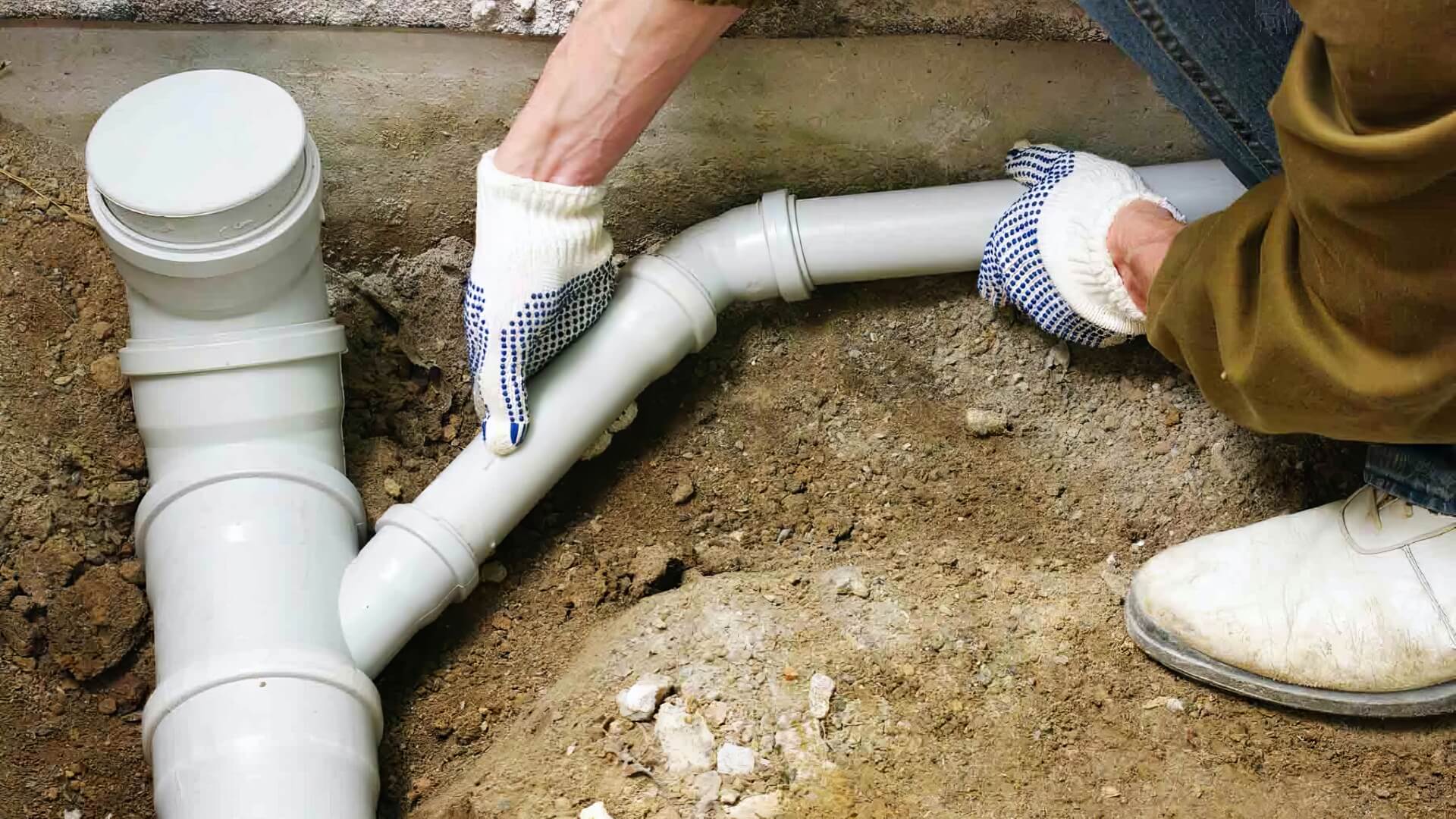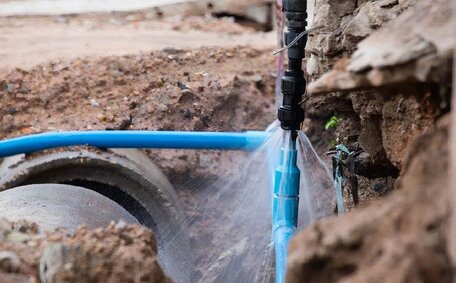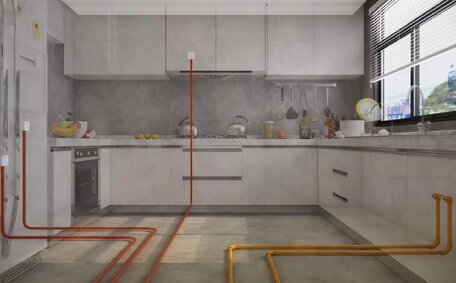Are Relined Pipes Safe for Drinking Water?
Pipe relining efficiently repairs pipes without traditional excavation, resulting in minimal intrusion and minimal disruption. The process involves applying an epoxy coating inside of the pipes so they can undergo a transformative water pipe repair with a hardened epoxy resin to seal cracks and restore structural integrity.
However, some property owners wonder what pipe relining truly means and if it results in pipes that are safe for drinking water.
When executed by certified professionals, pipe relining is safe for your home’s drinking water system. The pipe relining system has also proven effective at preventing contaminants from lead pipes, bacteria, and other impurities from seeping into drinking water and are used to improve water quality.
Research corroborates the efficacy of using pipe relining for pipe repair, demonstrating that harmful chemicals do not leach into drinking water.
Over time, the epoxy barrier may need reapplication as the pipe ages.
Hurstville Plumbing’s team specialises in managing pipe repairs within strict safety protocols.
In summary, a balanced evaluation of the pros cons illustrates pipe relining as safe, durable, and cost-effective pipe repair solutions to restore your home’s water lines without disturbing the surrounding landscape. Properly installed, they present no health risks, ensuring safe drinking water quality. Our team highly recommends you reach out to us for a comprehensive consultation on pipe relining cost if you have any concerns regarding the piping infrastructure at your residence.
Health and Safety Standards for Pipe Relining Materials
The safety of epoxy resins, used in pipe relining to create a new pipe within the old one, is uncompromising and ensures safe contact with potable water once cured. We ensure these high standards are met so that the relining material can be applied to all types pipes, whether comprised of copper or lead, thus adhering to global safety benchmarks like NSF/ANSI 61 and KTW guidelines.
These epoxy coatings act as a formidable fortress against pinhole leaks, creating an effective barrier between lead pipes and your water supply, effectively blocking the leaching of metals, bacteria, and potential contaminants. Studies by the EPA and German Institute of Health confirm properly applied epoxy linings in copper pipe systems remain stable and effective for 50+ years before needing reapplication.
Certified technicians expertly handle water and gas hot water issues, deftly using air pressure to secure the resin lining against the pipe walls during installation. The resin undergoes a critical cipp curedinplace pipe process, hardening to mend fractures after being pulled into place against the pipe walls. This trenchless technique is less disruptive, Restoring pipes swiftly without the need to dig, offering an efficient restoration approach.
In summary, the wide-ranging benefits pipe relining encompass the use of epoxy resins, ensuring safety and durability, establishing this method as an exceptional solution for rehabilitating potable water lines.
Testing Methods to Ensure Compliance
There are stringent validation processes to confirm that relined pipes meet health and safety standards for potable water contact.
Epoxy coatings applied during the relining process must be certified to NSF/ANSI Standard 61 by an accredited body. This involves testing for any kind of leaching of toxic elements or volatile organics into the water.
Cured samples are subjected to rigorous assessments for relining pipe integrity to ascertain that there are no breaches under pressure, confirming its suitability for various pipes via hardness and chemical resistance measurements using different disinfectants. Epoxy linings are tested for durability and long-term stability when exposed to cold water, hot water, chlorine and other chemicals, showing that pipes can be relined and withstand various environmental factors.
In Australia, materials for relined drinking water pipes must comply with AS/NZS 4020 for products in contact with potable water. Our technicians utilise composite resin systems certified by SAI Global to stringent safety standards, suitable for various pipe configurations.
We make sure to adhere to strict industry best practices for safety health on pipe preparation, proper cure times and post-installation disinfection prior to returning pipes to service. This thorough validation process guarantees safety compliance and confirms suitability for a variety of pipes.
Common Materials Used for Pipe Relining
Epoxy resin excels in mending damaged pipe infrastructure, recognised for its unparalleled strength, resilience, and inert qualities that ensure safe drinking water.
Once cured, relining technology using epoxy forms a smooth internal pipe coating that seals cracks and prevents degradation in the old pipe walls. It establishes a protective barrier that guards the existing pipe against corrosion and blocks metals like lead from infiltrating the copper pipes’ water supply.
We offer a variety of effective relining materials, including polyurethane resins, UV-cured glass resin, cement mortar linings, and PVC pipe solutions. Epoxy is favoured for preserving water flavour, offers thermal and chemical resistance, and has a service life exceeding 50 years.
Our technicians invest time and are very professional, showcasing their ability to repair using advanced technology, meticulously enhancing water mains and the piping system with 100% solids epoxy that conforms to water safety standards like NSF-61. We adhere to stringent industry guidelines on surface preparation, air pressure curing, cure times, and disinfection for a safe relined drinking water system.
The Pipe Relining Process and Procedures
Pipe relining is a multi-step process that renews old pipes from the inside out as a less invasive alternative to pipe replacement.
Firstly, our technicians employ specialised CCTV cameras to inspect sewer pipes within your property and identify issues like blocked drains that was detected, requiring repair. Following surface cleaning and preparation, we mix the specialised compound and insert the epoxy resin into the pipe for a seamless repair. The Blueline system inflates epoxy resin lining and presses it against the pipe walls with compressed air, forming a solid defence against tree roots.
The epoxy resin then cures to form a smooth, joint-free barrier lining within the hot water system, effectively insulating the lead pipe and negating the need to dig. This trenchless technique combats tree roots intrusion by restoring structural integrity and sealing cracks and holes in the pipes without the need to dig up your landscape or disturb your property.
Our epoxy pipe linings meet stringent health and safety standards for potable water contact like NSF-61, effectively sealing water leaks and ensuring safety. Over 50+ years, they help ensure your pipe last longer, preventing corrosion, leakage and contamination issues. We provide warranties on our trenchless pipe relining work, ensuring the long-term reliability of your pipes.
compared to traditional pipe replacement, pipe relining emerges as a more cost effective and less disruptive method, Offering more benefits than traditional pipe replacement. It keeps water infrastructure intact and avoids major landscaping costs. At Hurstville Plumbing, our experienced technicians deliver critical enhancements to your plumbing system, preserving its functionality while minimising impact on your home or business.
Proper Installation Methods to Ensure Potable Water Integrity
To guarantee the safety of drinking water after pipe relining, it is vital qualified professionals carry out the work following proper installation methods.
Technicians, before relining, diligently clean the pipe surface to repair damage of your galvanized steel or other metal pipes using high-pressure water jets. This removes corrosion and prepares the pipe walls for maximum epoxy resin adhesion. Technicians ensure meticulous drying of the pipe to optimise conditions for the next step.
We exclusively use NSF-61 approved food-grade epoxy resins for potable water pipe relining. Resin quantity and curing times are precisely calculated to ensure full hardening and conformity to the pipe walls. Post-installation disinfection and flushing procedures validate no contamination occurred.
Industry standards like AS/NZS 4020:2005 must also be adhered to. This covers testing of physical properties, changing conditions from disinfectants, effects of temperature fluctuations and other critical factors impacting drinking water integrity.
By following regulated work procedures using specialised tools and safety-compliant epoxy resins, our professional technicians guarantee your relined pipes maintain ongoing water quality and pose no health risks.
Inspecting and Monitoring Relined Pipes
To validate the ongoing integrity of relined drinking water pipes, accredited technicians conduct comprehensive inspections and tests at regular intervals.
With CCTV cameras, Specialists at Hurstville Plumbing, leaders in relining Sydney’s intricate pipe systems, meticulously inspect the interior surfaces of pipes your home for any initial irregularities, ensuring precise and comprehensive repairs. Specialised hardness tests check the epoxy barrier remains intact without cracks or weaknesses. Pull-out testing validates strong resin bonding to pipe walls, verifying structural stability.
Industry standards require testing for hazardous elements leaching into water samples. Any relined pipes not meeting safety thresholds would be flagged for remediation or replacement. However, cured epoxy linings meeting potable standards often service homes safely for 50+ years before needing repairs.
Certified plumbers recommend monitoring for pressure fluctuations, usage changes, and early leak signs to identify potential pipe issues. This allows preventative action to reinforce long-term drinking water safety.
Through rigorous installation methods and ongoing performance validation, pipe relining provides a proven, non-toxic solution to restore ageing water lines without health or contamination risks.
The Durability and Lifespan of Relined Pipes
Relined pipes, when properly installed, have exceptional durability, surpassing that of traditional pipe materials. German research indicates that epoxy-relined pipes can function for over 100 years due to the corrosion resistance of the resin barrier.
US testing further revealed how long does epoxy coatings maintain potable water lines intact – enduring for 60+ years under normal operational conditions. The smooth interior surface not only preserves existing pipes but also ensures an optimal flow rate by avoiding buildup and friction damage over time. Periodic inspection confirms the hardened resin remains bonded without cracks or defects.
To uphold safety and health standards, relined pipes must withstand pressurisation, temperature changes, and chemical contact without compromising water quality. Industry safety standards include testing cured epoxy linings to guarantee 50+ years of reliable structural integrity and contamination prevention before reapplying a fresh barrier coating when needed.
In summary, relining provides extremely durable water pipe renewal lasting up to a century. The epoxy forms a protective layer far outlasting corroded metal alone, with research validating safe water contact and secure flow across decades of service.
Case Studies on Relined Pipes in Potable Water Systems
Commencing a project to replace pipes that integrate the sewer stormwater systems of your home usually entails a highly invasive and disruptive process. That’s why pipe relining is an attractive alternative. Here are some case studies on relined drinking water pipes:
Heritage Building Apartment Tower
Our team effectively repaired ageing cast iron and galvanised pipes, enhancing water quality without compromising the heritage building’s structure. We renovated over 50 apartment lines and received positive feedback; post-installation tests confirmed a safe, clean water supply.
Large Private Hospital
Our team can repair efficiently and professionally, as they renewed 1.2km of deteriorating water main at a leading Sydney private hospital with EPOXY pipe relining. Patients and staff continued their daily activities uninterrupted, as the job was carried out seamlessly with no disruption to hospital operations, a testament to our efficiency and professionalism. Relining can ensure that pipes meet long-term potable water contact standards, demonstrated by independent lab certification to AS/NZS 4020 and WaterMark.
150mm Trunk Main in Residential Area
A degrading 150mm sewer pipe serving 82 properties was relined over 350 metres including junctions for side streets. Structural CCTV scans 2 years on show the epoxy barrier remains fully intact. Regular sampling proves water quality consistency thanks to the epoxy lining.
Our team is evidenced by these large and small-scale residential case studies that showcase how properly installed pipe relining restores drinking water line integrity without service impacts. Contact us to learn how we can rapidly reline your ageing pipes.
Addressing Concerns Over Relined Pipe Safety
Understanding pipe relining’s positive impact on safety is crucial for ensuring clean drinking water and reliable gas supply. Some property owners question does pipe relining pose contamination risks from bacteria, chemicals, or metals leaching into the water supply. On the other hand, extensive research validates that proper installation of epoxy-lined pipes during pipe relining meets strict safety and health standards.
Epoxy coatings used for relining drinking water pipes must be certified to NSF/ANSI Standard 61. This ensures inertness and demonstrates pipe relining effective at preventing toxic elements from leaching into potable water after curing.
This resin-based repair method also forms a corrosion-resistant layer suitable for a range of water-related applications, helping to curb lead and bacterial accumulation in the used pipe. Periodic tests monitor for hazards before they compromise water quality.
Relined pipes have a smooth, non-porous lining that deters microbial growth. Annual inspections also check for abnormal bacterial levels. If found, pipes get disinfected to restore clean supply.
Any damage allowing water contact with underlying metal gets repaired quickly using a new epoxy layer.
In summary, correctly relined pipes, which may include fire suppression systems, exceeding safety standards should not raise health concerns. We adhere to best practises for surface preparation, NSF-61 resin use, air-tight installation and cure times to deliver optimal drinking water line integrity without risks.






